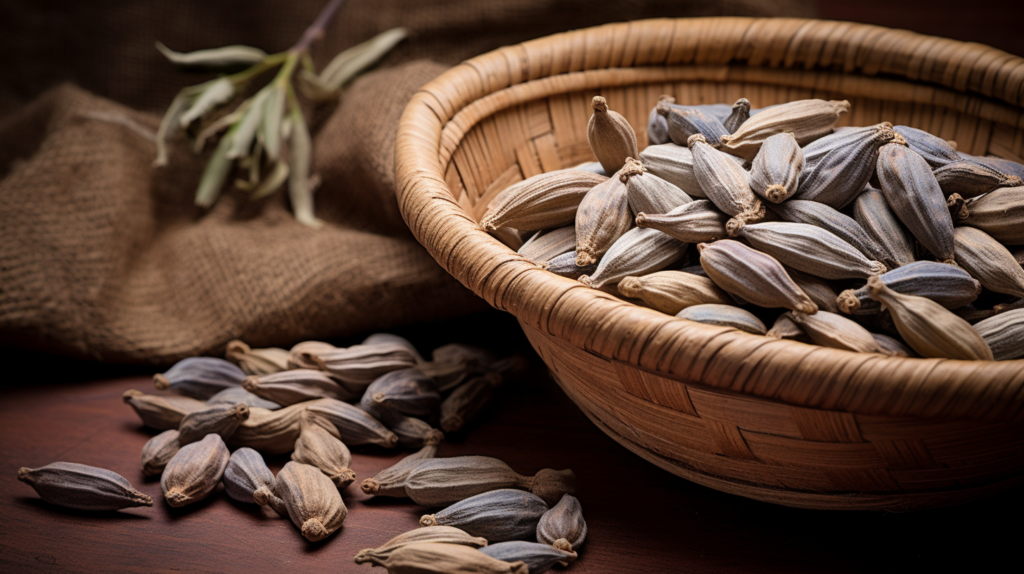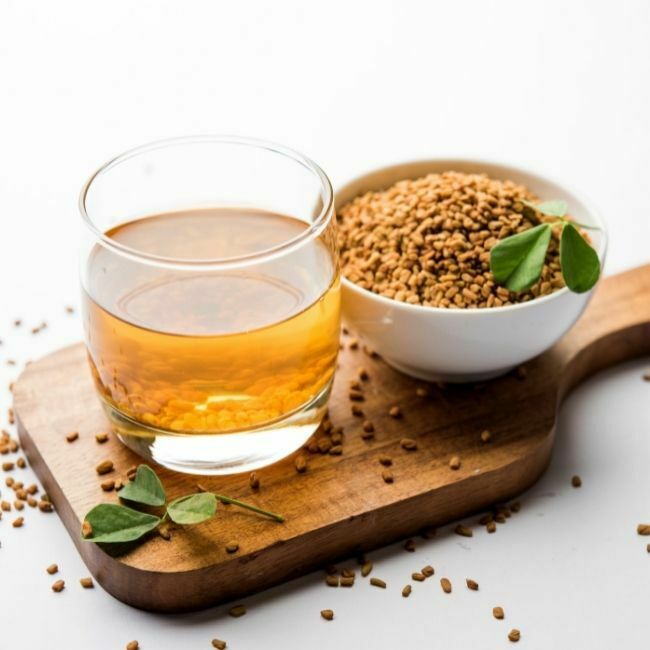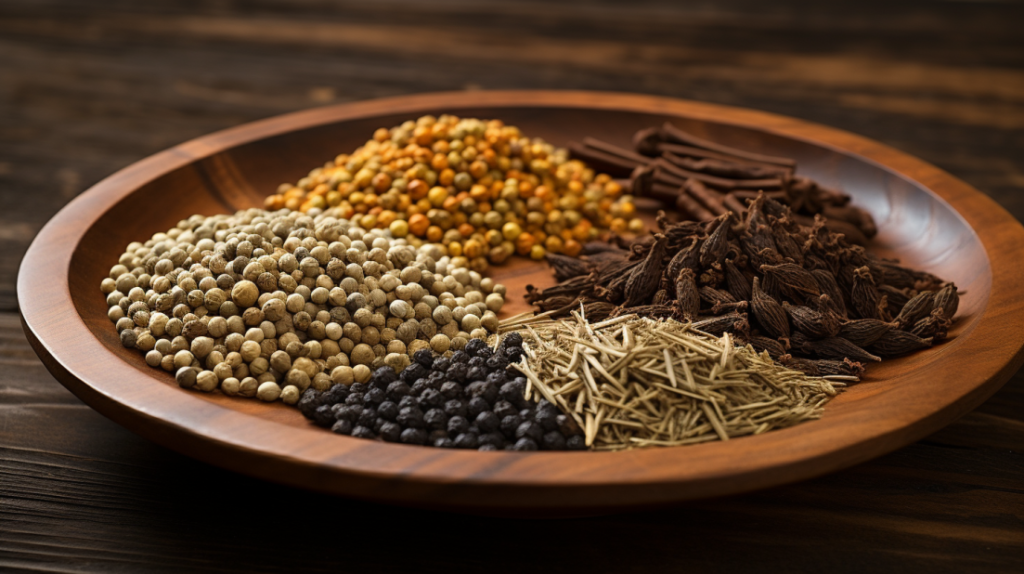In the vast panorama of global cuisine and cosmetics, African spices like cardamom, grains of paradise, and fenugreek stand out for their distinctive flavours and healthful benefits. These spices journey from the heart of Africa to the wider world, infusing dishes and beauty products with their unique essence. Their role transcends mere culinary delight, intertwining with cultural heritage and traditional wellness practices. This exploration delves into the vibrant world of these spices, unravelling their culinary allure, health advantages, and the expanding horizon of their global influence in an accessible yet insightful manner.
Cardamon: The Fragrant Pod of Wellness
Cardamom, often nestled in the lush forests of the Western Ghats and also grown in parts of Africa, is a spice that’s as versatile as it is fragrant. Its journey from the heart of nature to our kitchens and medicine cabinets is as rich as its flavour. Encased in tiny, green pods are black seeds, bursting with a robust and slightly citrusy aroma, making them a coveted ingredient in a myriad of dishes worldwide.
In culinary contexts, cardamom’s unique flavour profile — a blend of piquant and aromatic notes — allows it to seamlessly integrate into both sweet and savoury dishes. It’s a star in North African teas and Ethiopian stews, adding depth and complexity. Its reach extends beyond African cuisine, featuring Scandinavian pastries, Indian masalas, and even Middle Eastern coffees. The spice’s ability to pair well with a range of ingredients underscores its culinary significance.

Moreover, cardamom holds a revered spot in traditional medicine, particularly in Africa and India. It’s historically used for treating throat issues, and lung congestion, and as a digestive aid. Its medicinal properties are as diverse as its culinary uses, highlighting its importance in holistic wellness practices.
In the realm of cosmetics, cardamom’s benefits are equally impressive. Its essential oil, known for its antibacterial and antioxidant qualities, is a staple in skincare products. It enhances complexion and soothes skin irritations. Additionally, the spice’s invigorating scent makes it popular in aromatherapy, promoting mental clarity and calmness.
Overall, cardamom’s multifaceted nature — from enhancing flavours in diverse cuisines to its therapeutic and cosmetic applications — makes it a true gem among spices. Its global journey from African soil to worldwide recognition is a testament to its enduring appeal and versatility.
Grains of Paradise: A Peppery Treasure
Grains of Paradise, a lesser-known but fascinating spice, originates from West Africa. These small, reddish-brown seeds, akin to peppercorns, offer a unique taste – a blend of pepper, citrus, and cardamom. Historically, during Europe’s Middle Ages, they were a more affordable substitute for black pepper, hence the moniker ‘alligator pepper.’ In African kitchens, particularly in Ghana and Nigeria, these seeds are a culinary staple, adding a warm, zesty kick to stews, soups, and grilled dishes. Their ability to enhance flavours without dominating a dish makes them a cherished ingredient.
Beyond their culinary charm, Grains of Paradise boasts health benefits. They aid digestion and reduce inflammation, possibly even boosting metabolism. These seeds have been used in traditional African medicine for various ailments, from stomach issues to improving blood circulation. In the realm of cosmetics, extracts from these grains are found in skin care products, valued for their potential to improve skin elasticity and reduce cellulite. Their warming effect on the skin also makes them popular in massage oils. Grains of Paradise, thus, offer a tapestry of uses – from culinary delights to health and cosmetic applications – making them a true peppery treasure from Africa.
Fenugreek: The Multipurpose Marvel
Fenugreek, an unassuming yet multifaceted spice, is deeply ingrained in North African and Middle Eastern culinary traditions. Its small, angular seeds, imbued with a slightly sweet, bitter essence, are a cornerstone in various spice blends, like Ethiopian berbere and Moroccan ras el hanout. These seeds, typically ground into a fine powder, impart a unique maple-like aroma, skillfully balancing the flavours in curries, bread, and pickles.

Fenugreek seed oil
Cold pressed fenugreek seed oil for use in the food and cosmetic industry. Oil with a characteristic smell and yellow color.
Beyond its culinary prowess, fenugreek’s role in traditional medicine is notable. It’s celebrated for aiding digestion, stabilizing blood sugar levels, and being a galactagogue, promoting lactation in nursing mothers. The seeds’ high soluble fibre content also plays a part in cholesterol management.
In the beauty world, fenugreek, though not widely acclaimed, plays a key role. Its seeds, packed with nutrients, are a staple in hair care, boosting growth and shine. Fenugreek’s power isn’t just in hair wellness; its soothing and moisturizing qualities are a boon for skin, tackling dry patches and imperfections. This unsung hero, balancing simplicity with effectiveness, offers a natural approach to beauty concerns, demonstrating that sometimes, less-known ingredients can have a remarkable impact.
Fenugreek’s versatility, from enriching dishes with its distinctive flavour to supporting health and beauty routines, underscores its status as a multipurpose marvel. Its journey from local spice racks to global recognition mirrors an ever-growing appreciation for traditional, natural ingredients in our daily lives.
Conclusion: A Spice Renaissance
The growing global interest in cardamom, grains of paradise, and fenugreek reflects a broader trend toward embracing the diverse flavours and health benefits of African spices. These spices not only enrich our palates but also contribute to our well-being. As the world becomes more interconnected, the culinary and cosmetic uses of these African treasures are likely to expand, continuing their journey from local markets to global shelves. In summary, cardamom, grains of paradise, and fenugreek are not just spices but ambassadors of African heritage and natural wellness. Their incorporation into global cuisine and cosmetics highlights the interconnectedness of our world and the endless possibilities that arise when we explore and embrace diverse cultures and their treasures.
References
Oluwole, O. B., & Ademuyiwa, O. (2021). Antioxidants in Spices: A Review of the Antioxidant Components and Properties of Some Common African Spices and Their Role in Human Nutrition and–Microbe Interactions. Antioxidants in Plant-Microbe Interaction, 251-289.
Singletary, K. (2022). Cardamom: potential health benefits. Nutrition Today, 57(1), 38-49.
Barton, S. A. Melegueta or Grains of Paradise: To be ‘Pepperish’.
Sarwar, S., Hanif, M. A., Ayub, M. A., Boakye, Y. D., & Agyare, C. (2020). Fenugreek. In Medicinal Plants of South Asia (pp. 257-271). Elsevier.


